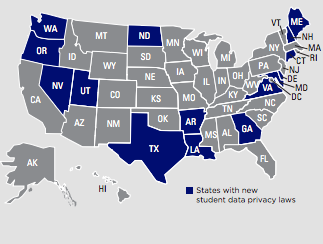Will States Step Back From Student Data Privacy Bills in 2016?

Rawpixel / Shutterstock.com

Connecting state and local government leaders
A new Data Quality Campaign report suggests more transparency for how information is collected and used, which may curb the need for burdensome legislation.
States are poised to propose fewer student data privacy bills in 2016, instead creating committees to develop policies on that issue in addition to teacher and health records privacy, according to a new Data Quality Campaign report.
This year, 46 states introduced 182 student privacy bills and 15 passed 28 laws because increasingly, data about demographics, transcripts, attendance, test scores and outcomes are being used to improve educational experiences and equality.
Legislation generally dealt with data and privacy requirements of online service providers—31 states considering them—and helping school districts with policies and training of their own. Districts received new privacy and security responsibilities in nine instances, some of the laws directing states to provide support.
“States can help curb misconceptions that continue to fuel potentially damaging legislation by being transparent about what data they collect, how and why the data are used, who has access to the data, and how the data are safeguarded,” Paige Kowalski, Data Quality Campaign vice president of policy and advocacy, said in a statement.
Most bills, 125 total, included prohibitive provisions—preventing the collection of, say, biometric data or the use of predictive analytics. Conversely, 122 governance bills sought to establish data security audits, dataset lists or chief privacy officer positions.

Opt-out provisions were included in 81 bills, up from 17 in 2014, driven by the perception government was intruding into education content and assessment or the data was irrelevant:
While opt-out may be a parental right in some cases, it is not necessarily a privacy protection and should not be treated as such in legislation. Privacy experts from the Future of Privacy Forum (FPF) note that “providing parents with more notice and choice may do little to actually protect student privacy.” In many cases opt-out serves only to shift the burden of risk assessment to the parent without the context to make an informed decision or actually providing any additional privacy protections.
While the provisions can be useful in preventing the sharing of student directory info, FPF recommends greater transparency regarding how the data is used.
Researcher access to student data was one other heavily debated issue with 61 bills addressing it—six of which were signed into law. The strongest laws created detailed research request review and approval policies, according to DQC.
Moving forward, the report advises states to pursue data policies that are transparent, communicate the value of the data being collected and support school boards and districts in their efforts.
Dave Nyczepir is News Editor for Government Executive’s Route Fifty.

NEXT STORY: DOT's plan to turn driving into a real-life computer game





